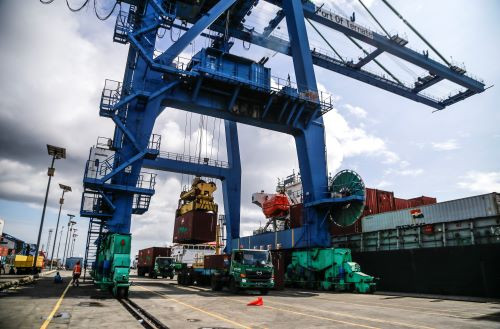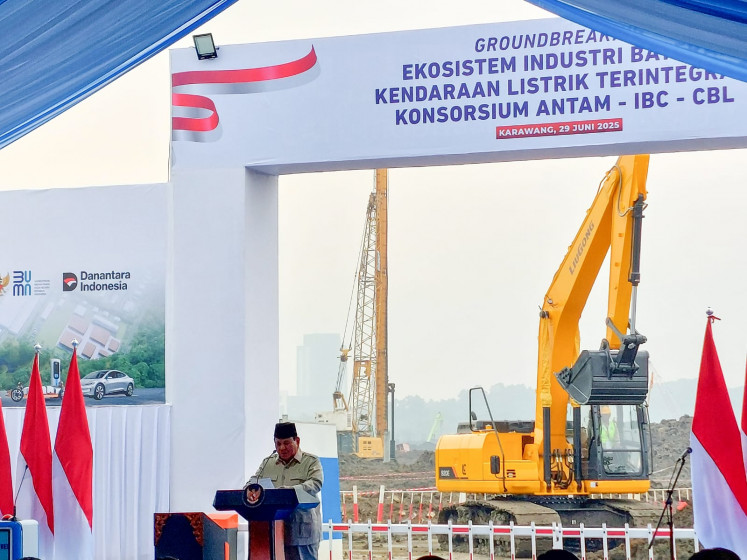Popular Reads
Top Results
Can't find what you're looking for?
View all search resultsPopular Reads
Top Results
Can't find what you're looking for?
View all search resultsCollateral damage in war against poachers
Susi Pudjiastuti - JP/ Wendra AjistyatamaAlmost two years after the government launched an unprecedented and exceptionally successful crackdown on illegal, unreported and unregulated (IUU) fishing practices, questions linger on how to economically capitalize on the success, particularly when the local fishing industry grapples with shortages of raw materials, forcing them to reduce operations and shed thousands of jobs
Change text size
Gift Premium Articles
to Anyone

Susi Pudjiastuti - JP/ Wendra Ajistyatama
Almost two years after the government launched an unprecedented and exceptionally successful crackdown on illegal, unreported and unregulated (IUU) fishing practices, questions linger on how to economically capitalize on the success, particularly when the local fishing industry grapples with shortages of raw materials, forcing them to reduce operations and shed thousands of jobs. The Jakarta Post’s Rendi A. Witular explores the issues. This is the first of two series of reports.
Dozens of locally made fishing vessels weighing more than 30 gross tons (GT) are docked idly at a port operated by fishing company PT Bintang Mandiri Bersaudara in North Sulawesi’s Bitung, the country’s biggest cluster of fish-processing plants.
One crew member said he had not gone fishing for more than a year now, but was still employed to keep the boat seaworthy. “A lot of my friends have been laid off. I am among the lucky few,” said the crew member.
Adjacent to the port is Bintang Mandiri’s cold storage and processing unit, which currently runs at less than 20 percent capacity, down from more than 60 percent before the government declared war on illegal fishing through a number of policies in November 2014.
Less than 5 kilometers from the site, PT Delta Pasific Indotuna, which exports all of its canned products to the Middle East, was forced to import tuna from India and South Korea in January after one buyer slapped hefty financial penalties and threatened to break its contract following the firm’s failure to deliver on time.
Delta, with its products sold under the Aloha, Almandab and Manara brands, among others, is having trouble sourcing tuna after its suppliers, such as Bintang Mandiri, almost ceased operating in the wake of the implementation of the stricter IUU fishing policies.
Spearheaded by firebrand Maritime Affairs and Fisheries Minister Susi Pudjiastuti, the country’s war against illegal fishing has taken a toll on an unintended victim; the local fish-processing industry, which employs thousands of largely manual workers.
Mid-size fishing companies, such as Bintang Mandiri, which has never been involved in IUU fishing, employs Indonesian crews only, sources all its ships from domestic shipyards and receives capital for investment from state-run banks, have also fallen victim.
Around 10,000 workers have been dismissed in Bitung alone in the past year, according to North Sulawesi’s Association of Fish Processing Units (AUPI). The figure is far higher than the 1,700 workers claimed by the Maritime Affairs and Fishery Ministry.

While local fishermen operating smaller than 10 GT boats are the immediate gainers from the IUU crackdown, as many indicators suggest, the past year has not been favorable to the fishing industry, particularly in North Sulawesi and Maluku — the provinces with the heaviest reliance on the fisheries business.
Claims of difficulties by the industry may not be exaggerated or casuistic, as insisted by the ministry.
Bank Indonesia’s (BI) recent research on the regional economy, has blamed the rigid anti-IUU policy for the decline in economic growth in North Sulawesi and Maluku in 2015, where the fisheries sector is the economic backbone. Shortages in raw materials have severely hit the industry there.
The central bank said the economy in North Sulawesi slowed even further in the first and second quarter of this year compared to the same period last year, and the fisheries business has yet to fully recover despite several policy relaxations.
Maluku also suffered a rise in unemployment early this year as layoffs in fisheries companies soared, according to the BI report, despite the province recording higher economic growth in the first and second quarter of the year with a recovery in fish catches.
Even the tuna-processing industry in Bali has also taken a hit with BI reporting that several export-oriented processing plants have ceased operations and shifted to catching squid.
BI’s findings, coupled with reports from industry representatives, seem to agree that the shortages in supply for the processing industry have been caused by the policy prohibiting transshipment — the practice by which a fishing boat transfers its catch in the middle of the sea to a transportation ship for delivery on land.
Transshipment has been blamed in the past for the widespread poaching that has caused the country more than US$20 billion in potential losses. Through transshipment, transportation vessels pool the catches, and directly ship them to Thailand, China, Taiwan and the Philippines without first being processed in Indonesia.
Nationalized foreign-made vessels, known locally as ex-asing and formerly operated as joint ventures with local companies, have been blamed largely for contributing to the illegal transshipment and for the widespread practice of illegal fishing. The ministry has banned the operations of more than 1,100 ex-asing ships since late 2014.

Adding to the problem, the total ban on transshipment covers all fishing companies, including those that have never been involved IUU fishing in the past and have employed locally made vessels only.
The policy, however, has triggered a domino effect in which fishermen with larger than 30 GT vessels, which usually sell their catches to industry, can no longer catch fish in an efficient way without transshipment. Supply to the industry has since been interrupted.
“If you want to get rid of the mice, don’t burn the barn,” said Rudy Walukow, the chairman of North Sulawesi’s Association of National Fishing Vessels (AKPN), which groups together owners of Indonesia-made fishing vessels only.
“We fully support the ban against transshipment for delivery to other countries. That should not be lifted in any way. But please, we need to have the regulation relaxed for transshipment to local ports,” Rudy said.
Transshipment is required particularly for big fishing boats sailing more than 10 miles off coast so that they do not have to return to their port of origin once they are fully loaded, as they can transfer the catches into transportation vessels.
Following widespread protests demanding the reinstatement of transshipment for local delivery, the Maritime Affairs and Fisheries Ministry issued a regulation in late April to allow the practice, but under strict supervision and mechanisms.
However, the required mechanisms reportedly cannot be fully applied on the ground.
Probably out of concern for the poor performance of the fisheries industry, as its exports suffered a 15 percent plunge last year, President Joko “Jokowi” Widodo issued in late August a presidential instruction for all relevant ministries to take measures to accelerate fisheries development.
The instruction requires, among other issues, that the Maritime Affairs and Fisheries Ministry evaluate regulations hampering the sector’s development and increase fish catches and cultivation to boost raw material supply for the industry.
The instruction also came amid reports that while the domestic processing industry has been undermined, similar businesses in General Santos in southern Philippines, located near Bitung, peaked in the first half of this year after plunging last year as it reeled from the impact of the IUU crackdown in Indonesia.
Supplies of raw materials to General Santos have long been suspected of being illegally sourced from Indonesian waters.
“I don’t think they get the fish directly from Indonesian fishing vessels because of the strict supervision,” said AUPI chairman Basmi Said. “I have received reports that because we don’t catch the spawning migrating fish, the Philippine fishermen take advantage of them with their fishing vessels waiting on the border to net them.”
Despite the pervasive concerns, Susi has signaled she will not authorize further relaxations. The iron lady has argued that because IUU fishing in Bitung and nearby areas remains rampant, it would be a mistake to provide more leeway.
She claimed many Philippine transportation vessels had approached the waters near Bitung to conduct transshipment with local fishing vessels, and she has demanded that the Navy’s Eastern Fleet take the problem seriously by increasing its patrols there.
“That explains why General Santos is thriving again. I was initially reluctant to allow the transshipment there, but many people demanded it. Now we have seen the consequences,” she said.









